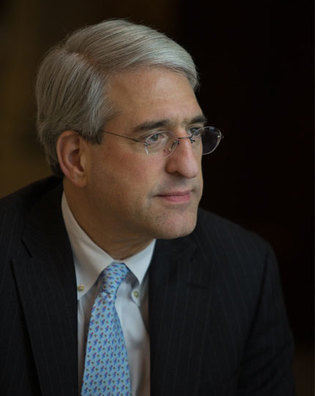 loading
loading
Q&A: Peter SaloveyA deeper look at renamingA committee will develop criteria for reviewing place names on campus. The Yale Alumni Magazine regularly holds a conversation with Yale president Peter Salovey ’86PhD to provide a forum in which alumni can learn his views. (Interviews are conducted both in person and by e-mail and condensed for print.)  Mark OstowIn this issue, Salovey talks about a new committee to establish principles for renaming campus buildings. View full imageY: You announced in August a new committee that will recommend principles to guide decisions on removing historical names from places at Yale. Did you feel that there was a lack—that the process used in the earlier decision about Calhoun needed changing? S: These issues, nationally and on Yale’s campus, are not going away. So we need to be much more explicit in articulating for our campus the principles that would guide such a decision. In the conversation we had last year, I certainly had particular principles in mind, and I imagine everybody who was a part of that conversation had principles around which they formulated their own views. But we need principles that will generalize beyond any particular naming controversy—so that, as additional naming questions come to us, we’ll be able to make decisions in a consistent way. We must start by asking, what is the purpose of naming? For what reasons do we name a space for a historical figure, and for what reasons would we remove the name from a space already named? If we answer those larger questions specifically and publicly, drawing on relevant experts in our university community, we won’t have to devise principles anew every time a question is raised. And by making our reasoning widely available, we may contribute to the national debate about naming. Forty-two years ago, a committee chaired by Professor C. Vann Woodward articulated a set of principles regarding free expression on campus. They have served Yale well, and other campuses were influenced by them. Another committee, chaired by law professor John Simon, articulated principles for ethical investing of the endowment, and many nonprofit organizations now use the book based on that work, The Ethical Investor. Y: So you foresee that these issues may come up again. Do you believe the name of Calhoun College will be revisited? S: I don’t want to anticipate, in advance of this committee’s work, either what the principles will be or what will happen when they’re applied. But there are many faculty, students, and alumni who feel strongly about names on this campus, Calhoun being the one that has attracted by far the most attention. And so I expect that the name Calhoun will be tested against these principles. Y: How did you choose the committee? S: We wanted a committee small enough to do its work efficiently, but broadly representative of the Yale community—faculty, alumni, staff, and students. In constituting the committee, the most important guiding idea was bringing relevant expertise to the questions at hand. Last year, when we discussed the naming issues with all constituencies, participation was broad. More than 5,000 pieces of input came our way, through various channels and from various sources. But we are a university and, in retrospect, we could have done a better job of channeling relevant expertise. So the composition of this committee is tipped in that direction. The chair is John Witt [’94, ’99JD, ’99PhD], an American historian whose primary faculty appointment is in the Yale Law School. He’s written on subjects from Abraham Lincoln to Brown v. Board of Education, and he has legal training, which lends itself to the task of developing principles and arguing from principles. The special adviser to the committee is David Blight, our resident faculty expert on nineteenth-century American history and the history of slavery and abolition, in particular. Probably nobody on our campus has been asked more often to speak on Confederate memorials, for example, than David Blight. There are four other faculty members, three alumni, two students (one of them an undergraduate), and a member of the staff. (Please see full list at this link: http://president.yale.edu/committee-establish-principles-renaming.) The alumni are former Yale Corporation Fellow Len Baker [’66], federal judge Mimi Wright [’86], and Tom Bernstein [’74, ’77 JD], chair of the United States Holocaust Memorial Council. I won’t list them all by name, but every member of the committee shares a love for the university and the desire to see the university articulate principles that allow us to do the right thing. Y: Do you feel that Yale was not doing the right thing before? S: On the contrary. The process last year was legitimate, honest, and participated in by many, many people. But it focused primarily on certain individual names rather than on principles that could be generalized. In other words, that conversation started with specific cases and then tried to think them through in a systematic way. But now we need to start at a different point—with principles that can then be brought to bear on any specific case. That will prove most useful long term.
The comment period has expired.
|
|